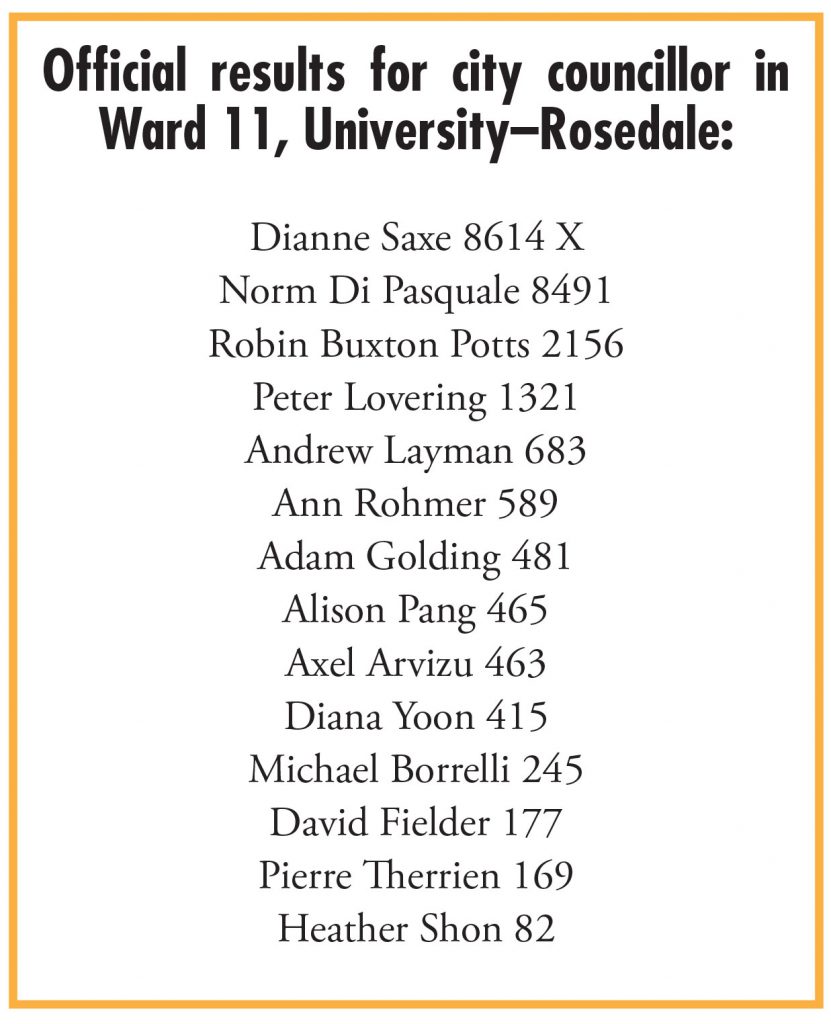Two unsuccessful candidates share their thoughts
Compiled by Brian Burchell
The Gleaner reached out to the top performing candidates to get their take on such a competitive race.
What are your thoughts about the campaign and in particular the challenge of running against other “progressive” candidates?
Norm Di Pasquale: I was proud to have earned the support of Progress Toronto in Ward 11 as one of their supported progressive champions. I would like to thank the residents of University-Rosedale for responding so well to the progressive vision that my team outlined for the ward. The result wasn’t what we had hoped for, but I appreciate the faith many University-Rosedale residents had in me.
Of the eight or nine people who were serious, I was surprised how much I liked and admired them all.
—Peter Lovering
Peter Lovering: The campaign was exciting and very interesting. My thoughts on the crowded slate is that the city should vet candidates before the “proof” of the ballot is sent out (mid-September). In this election, there were two people who officially left the campaign prior to the “proof” being finalised; so, why were they not removed? That cost everybody 1004 votes alone and perhaps Norm the victory? Three other candidates had no contact information on the city site; yet, they got another 969 votes. Lastly, it was not the crowd that affected the results; it was very much the deep political party tactics and resources pumping the top three candidates that had the most effect. The city needs to crack down on NDP, Liberal and Green party involvement at the municipal level if they want to be serious about fair elections. I have a list of over a dozen fixes if you need an op-ed sometime.
Of the eight or nine people who were serious, I was surprised how much I liked and admired them all.
What did you learn about the University-Rosedale ward during the campaign and did you glean any Annex-specific polling data that you could share?
Norm Di Pasquale: University-Rosedale overall has one of the finest tree canopies in old Toronto. It was wonderful after a stressful day at work to canvass underneath the canopy. We should ensure that everyone can enjoy such a fine tree canopy across the city. I also cycled over 300 kilometres in protected University-Rosedale bike lanes over the campaign. We must continue relentlessly to add safe protected bike lanes across the ward and the city.
Peter Lovering: University-Rosedale is vast. The thing that surprised me the most about the Annex is how dense it already is. When you walk up to every door, you see the number of doorbells and hydrometers. I fear for greater densification in the Annex; it is bursting at the seams.
What’s next for you?
Norm Di Pasquale: I am now the co-chair of Ontario Place for All. I was a founding member of the grassroots organization that has so far saved the Cinesphere, pods, and Trillium Park from destruction by the Ontario Government. Learn more about us and support the cause at ontarioplaceforall.com.
Peter Lovering: Back to my business of publishing, consulting, and art.
Will you consider running again?
Norm Di Pasquale: Yes! You may see me back on the campaign trail in 2025 or 2026. Stay tuned for what’s next!
Peter Lovering: I would in the right circumstances.
The Gleaner reached out to each of the top performing candidates who finished behind Dianne Saxe: Norm Di Pasquale, Robin Buxton Potts, and Peter Lovering. Buxton Potts did not respond in time for publication.
READ MORE:
- NEWS: Saxe victorious in Ward 11 (Nov. 2022)
- NEWS: Taking the pulse at campaign parties (Nov. 2022)
- CITY ELECTION 2022: Q & A with councillor candidates (Oct 2022)

